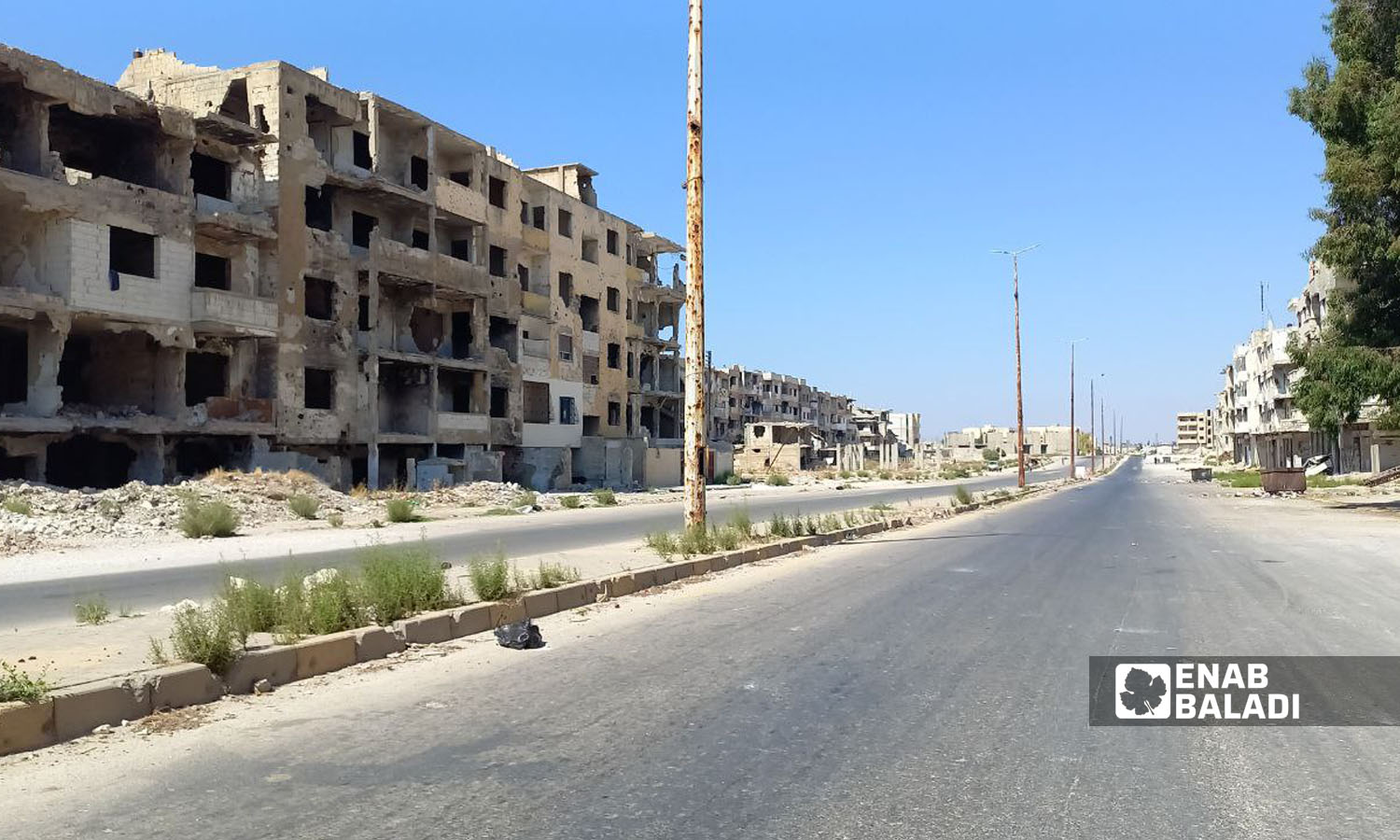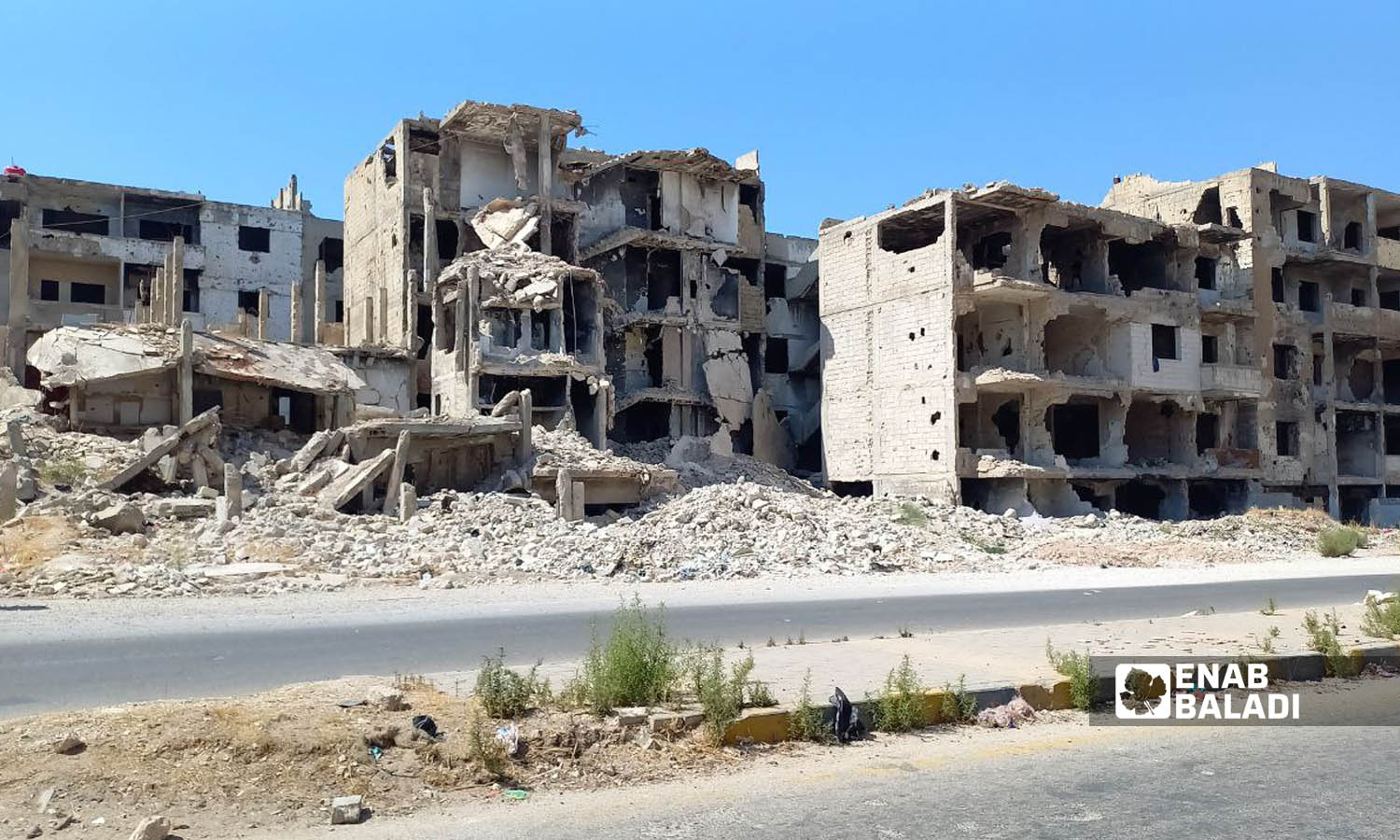



Enab Baladi – Orwah al-Mundhir
The remnants of the war are still claiming the lives of civilians in Homs, despite the passage of more than four years since the regime forces took control of the entire city in central Syria.
Despite the end of military operations in the area, the engineering teams of the regime forces did not work to remove the remnants of war in the residential areas that have witnessed military operations for years since 2011.
The war remnants spread from mines planted along the former contact lines, and the remnants of cluster bombs used by the regime forces against the opposition factions in the northern countryside of Homs and the al-Houla Plain, and in the Badia desert against the Islamic State (IS) group.
The explosion of war remnants was repeated by children or during the plowing of lands by farmers, and it has become a constant concern for the residents.
The Sports City in Wadi al-Zahab and the old neighborhoods of Homs are considered a focus for the spread of remnants of military equipment.
Waheed Yazbek, the local al-Madina FM radio correspondent, posted on his Facebook page on 24 October, news that the regime forces had found a large number of locally-made shells in the al-Qarabis neighborhood, despite the opposition forces’ departure from it since 2014.
The Sports City, in the Wadi al-Zahab neighborhood and the old neighborhoods of Homs, are considered one of the most dangerous places for children, especially since these areas have not been inspected for remnants of war or at least closed.
Ghanem, 45, of al-Khalidiya neighborhood, told Enab Baladi that the area is full of explosives on the sides of the roads or inside abandoned houses, which poses a permanent danger to children playing in its streets.
He added that more than one request was submitted through the mayors of the old neighborhoods to the Civil Defense Regiment in Homs to search neighborhoods and remove explosives, but the requests did not receive any response.
Al-Madina FM, on 24 October, quoted its correspondent in Homs as saying that an explosion of a war remnant in the sports facility in Wadi al-Zahab neighborhood caused the hand of a 13-year-old boy to be amputated.
Muhannad al-Yousef, of Dahiyat (district) al-Walid neighborhood, adjacent to the Sports City, told Enab Baladi that the Sports City had been used by the National Defense Forces as a warehouse for weapons and ammunition in the past, and this warehouse was exposed to an explosion in August 2013, which led to massive destruction in the facility.
“Despite the passage of five years since the explosion and the evacuation of the Sports City by the pro-regime National Defense units, explosive remnants are still filling the place, and the military engineering teams have not removed them,” al-Yousef added.
The regime and opposition forces planted mines along the lines of contact during the opposition forces’ control over the northern countryside of Homs, the al-Houla Plain, and nearby lands to fortify the fronts and prevent infiltration.
These mines remained in place, permanently threatening the lives of farmers with the withdrawal of the opposition from the area in mid-2018.
Abu Ibrahim al-Dhaikh, of al-Dar al-Kabira village in the northern countryside of Homs, told Enab Baladi that there are areas of agricultural land that were close to the front lines, whose owners have not been able to use it until now.
The farmers’ fear is due to the spread of mines and the remnants of shells, which they fear will explode, despite the submission of numerous requests to the provincial council and the Civil Defense, the area did not witness actual activity to remove them.
The remnants of cluster bombs fill the farms of the northern countryside of Homs, where the regime forces used them in their military operations in order to control the area.
Abdullah Dallah, a tractor owner in the city of al-Rastan, told Enab Baladi that there are many farms that people refuse to plow or work in them because they are aware of the presence of cluster bomb remnants in them, given the frequency of their explosions.
One of the tractor owners nearly lost his life while working on agricultural land in the northern countryside of Homs last year due to the explosion of a cluster bomb, according to Dallah.

A street in al-Khalidiya neighborhood in central Homs city – 8 September 2022 (Enab Baladi / Orwah al-Mundhir)
The Ottawa Convention signed in 1997, which Syria refused to sign, imposes a ban on the use, stockpiling, production, and transfer of anti-personnel mines.
Also, it requires the destruction of these mines, whether stored or planted in the ground, within a maximum of ten years and the necessary measures to ensure that civilians are actually removed from those areas through the implementation of awareness-raising programs about their dangers.
The Convention provided for the prosecution and punishment of persons engaged in activities prohibited by the treaty, to submit annual reports to the United Nations Security Council (UNSC), where the steps taken by the State to implement the treaty are viewed, and to work with other States to facilitate compliance with the treaty, including by facilitating the work of fact-finding missions in collecting information on matters relating to compliance with the treaty, as required.
if you think the article contain wrong information or you have additional details Send Correction